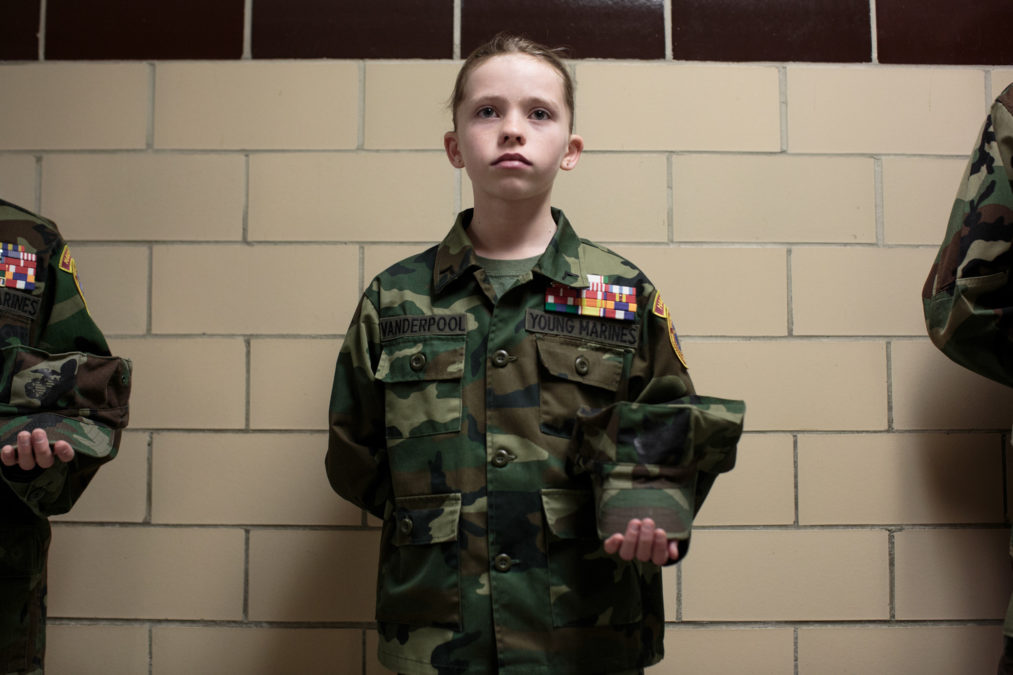Youth Camps Shape New Generations with Patriotism, Pushups and Prayer
ANGLO AMERICA, MILITARISM, EDUCATION, 19 Mar 2018
Will Carless | Reveal-The Center for Investigative Reporting – TRANSCEND Media Service
9 Mar 2018 – In rural central Florida, a group of children sit on a jetty, their reflections dappled in water the color of iced tea. It is quiet. Stifling, peaceful. The children pray over the breakfast they’re about to eat and ask for blessings for those whose hands prepared it. And they ask for safety during their upcoming weapons training, during which they will learn how to disarm a knife-wielding attacker, load a rifle and properly handle a handgun.
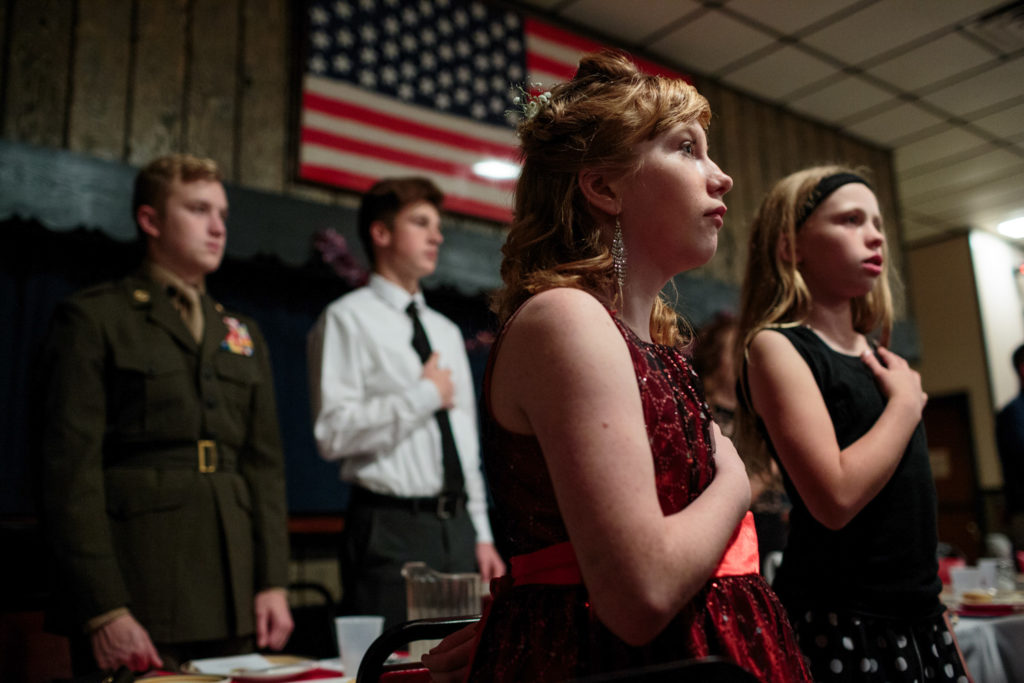
Students in the Young Marines program in Hanover, Pa., attend a ball at a Veterans of Foreign Wars hall in October 2017. They wear their finest dresses and suits. Their eyes fix on a large American flag as the national anthem falls from their lips. Credit: Sarah Blesener for Reveal
In Harlingen, Texas, young boys loll on the grass in the sunshine, swapping their families’ war stories.
“My uncle killed Taliban in Afghanistan,” one boy says nonchalantly.
Another shares a tale about a relative who tried to sneak an AK-47 back to the U.S. The boys will spend a few more weeks at this private quasi-military camp, where they will engage in physical, mental and weapons training. Some of them dream of a career in the armed forces.
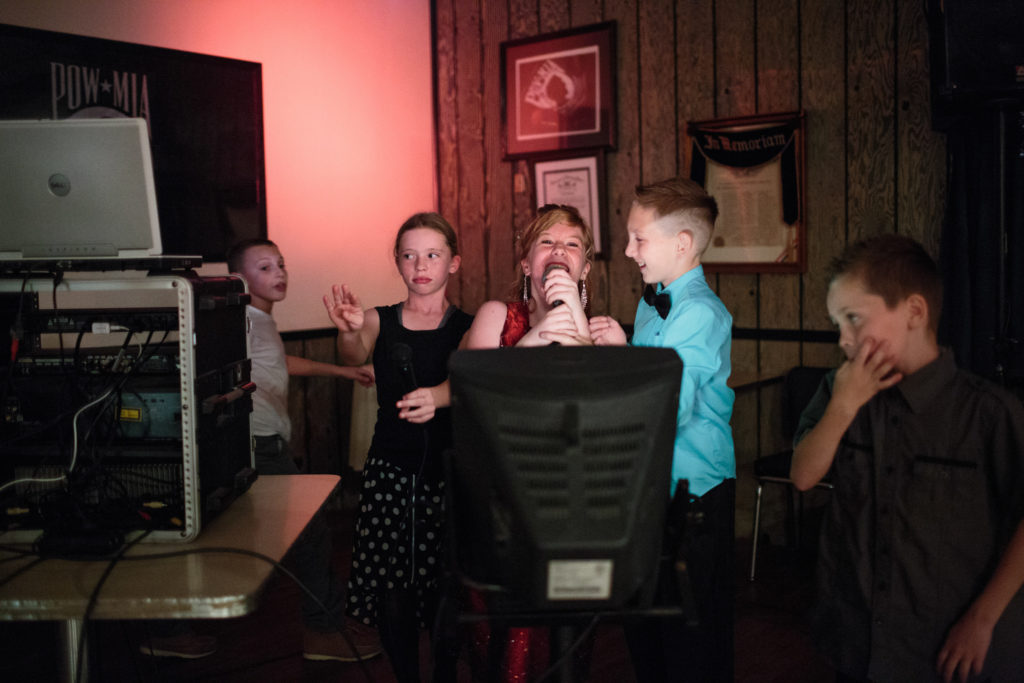
Young Marines sing “Yellow Submarine” on a karaoke machine at a ball with their families and fellow students in Hanover, Pa., in October 2017. The Young Marines is a nonprofit organization with about 10,000 students enrolled nationwide. Enrollment begins at the age 8. Credit: Sarah Blesener for Reveal
In the small town of Herriman, Utah, children as young as 6 learn the Declaration of Independence by putting it to song. Over a few hot summer days, they will learn about “Americanism,” a blend of patriotism and history that casually mixes in some of the basic tenets of radical libertarianism. During one lesson, they’ll pretend to overturn a boat full of tea into Boston Harbor. In another class, these elementary school children will be taught that it is wrong for the government to force them to pay for social programs in the form of taxes.
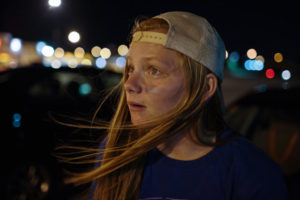
Elizabeth Nelson, 17, dons stripes of black paint on her face in her hometown of Omaha, Nebraska, in August 2017. She enlisted in the Army the summer before her senior year of high school and will ship out to boot camp three days after she graduates. “I feel like Omaha is not really the place for me,” she says. “So I do kind of want to get the hell out of here.”
Credit: Sarah Blesener for Reveal
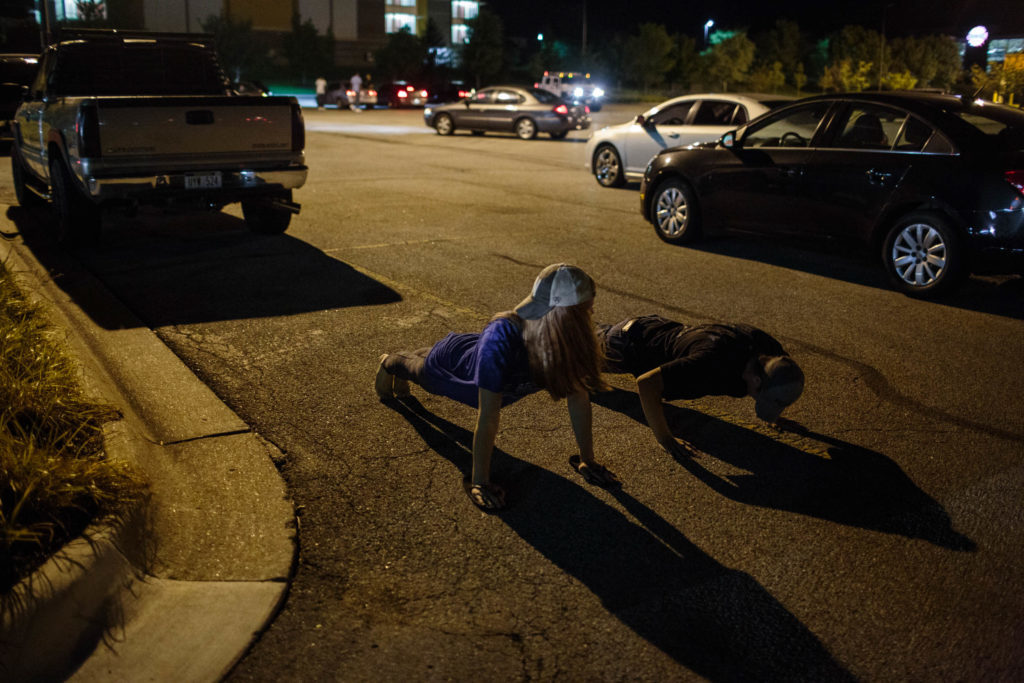
In a Home Depot parking lot in Omaha, Nebraska, 17-year-old Elizabeth Nelson challenges an acquaintance to a pushup contest. She yells, “15,” without her arms shaking. The boy next to her is breathing heavily and begins to fall slowly to the ground. Credit: Sarah Blesener for Reveal
New York-based photographer Sarah Blesener spent the past year traveling the United States visiting youth summer camps and events. She has photographed and interviewed dozens of children, from 8-year-old Utahns to teenagers in the Bronx borough of New York. She has camped in sweltering, bug-infested central Florida with religious survivalists and hiked the dusty frontier of the U.S.-Mexico border with 12-year-olds – most of them Latino – who want to “take down illegals.” Along the way, Blesener gained insight into not only how America’s youth think, but also the ways adults guide these children onto philosophical, religious and political paths.
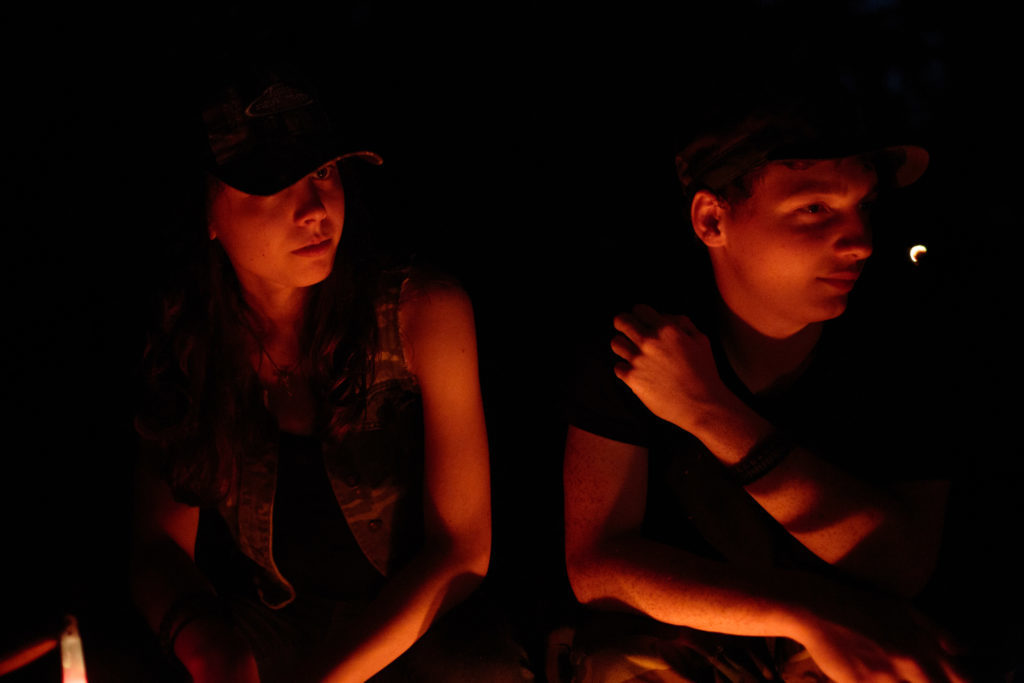
Jasmine Burke, 17, and Joseph Chubb, 17, spend an evening around a campfire in northern Florida in July 2017. The high school sweethearts are students of the North Florida Survival School, where young people are trained in firearm and knife safety and learn basic survival skills in the woods.
Credit: Sarah Blesener for Reveal
The camps Blesener visited – a slice of hundreds, if not thousands, of similar camps – fall into three general categories: patriotic camps, which aim to instill a love for America and a deep knowledge of the religious roots of the country’s founding; military camps, where children undergo rigorous physical training and are taught the discipline and skills crucial to a career in the armed forces; and survivalist camps, where kids learn skills such as building shelters and identifying edible plants in preparation for an apocalypse, natural disaster or the Second Coming.
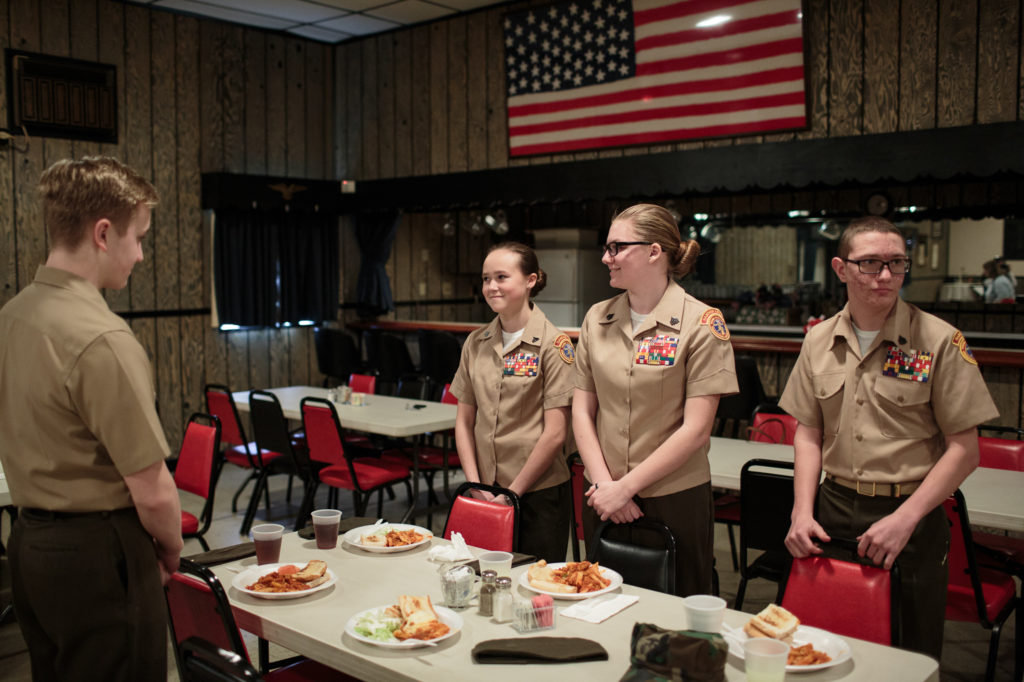
Lunch has been served at the Young Marines program in Hanover, Pa., but the students stand and anxiously scan the room. They all had attended a morning meeting on drug awareness education. But until their commander arrives and says a prayer for the meal, no one is allowed to eat. The Young Marines focuses on youth development in areas such as citizenship, patriotism and drug-free lifestyles. Credit: Sarah Blesener for Reveal
It would be tempting to assume that interest in the camps is directly related to recent shifts in U.S. society, the 2016 presidential election and a renewed spirit of American nationalism and patriotism.
But there are myriad reasons why these children attend camps. Some are keen to get a taste of military life, eager to see whether they can survive “boot camp light.” At the Utah patriot camps, most kids have been brought by parents who want them to experience unfiltered American pride they are unlikely to find anywhere else. And then there are the reluctant campers: the teenagers who lament losing half of their summers to patriotism, pushups and prayer, but attend because their parents make them and they don’t really have a say.
Many of these camps, especially the military ones, enforce strict dress codes. Taking care of your uniform is one of the primary rules at several camps Blesener visited. Even the patriot camps have their own uniform – bright red T-shirts emblazoned with the slogan “I Love America.”
The less formal camps are run and staffed primarily by volunteers, with paid professionals sometimes brought in to lead firearms safety or self-defense training. But the organized military camps, most of which form part of sprawling national organizations, have legions of paid staff, many of them veterans. Increasingly, these bigger camps look more like offshoots of the military than private enterprises, with their uniforms, ex-military staff and weapons – much of which are paid for indirectly by U.S. taxpayers.
“Overall, I wanted to look at how, as a culture, we pass down patriotic and military traditions to children,” said Blesener, who spent the year as a fellow at Reveal from The Center for Investigative Reporting with support from CatchLight and the Alexia Foundation. “And I think this is an extraordinarily interesting time to do this. America is so divided, and I wanted to speak to youth and see if they are as divided and what their worldview is and how they are being shaped as young adults.”
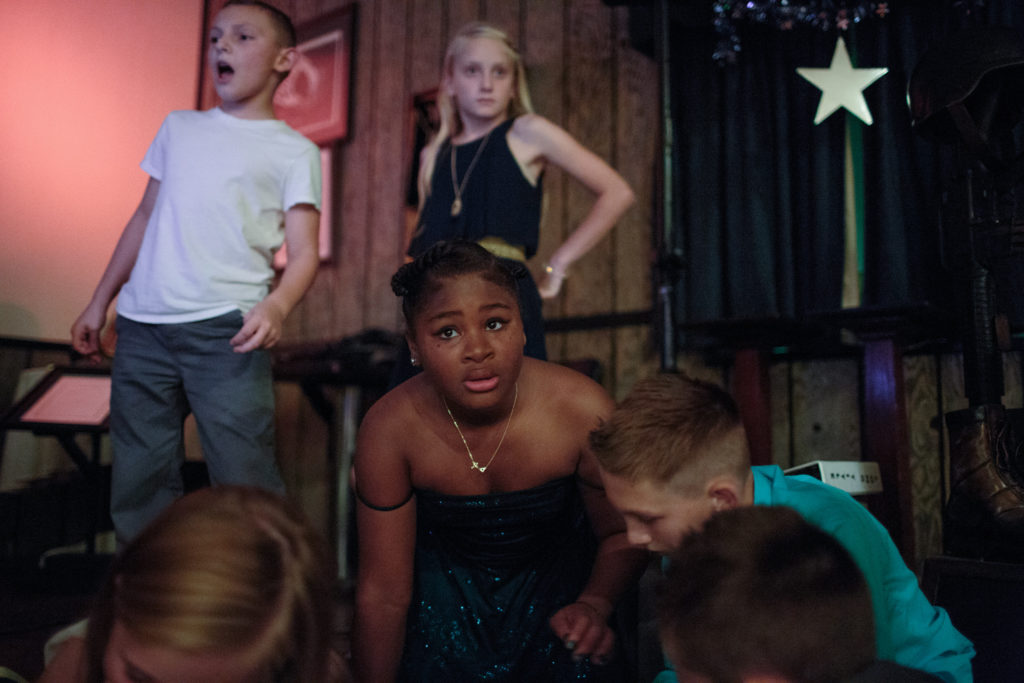
A group of Young Marines lingers near the karaoke machine during a ball in Hanover, Pa., in October 2017. It’s about 9 p.m., and the evening is starting to wind down. Older high school students sit texting on cellphones, younger siblings begin to nod off, and a few parents check their watches.
Credit: Sarah Blesener for Reveal
Forging a new ‘Americanism’
President Donald Trump’s campaign promise to “make America great again” is a message Julie Knudsen has been propagating for years: Not only should America reclaim a proud past, but it also desperately needs to regain pride in the greatness of the American experiment itself.
Back in 2011, Knudsen co-founded the Utah Patriot Camp. Aimed at children ages 5 to 12, the camp was a reaction to Obama-era American apologizing, she said. It was designed to be a safe place where children could learn the glories of the American republic – the beatific nature of this country’s birth.
“We teach the miracle that happened during the Revolution, that God’s hand was involved in the creation of America,” Knudsen said. “A lot of people come for that sort of stuff.”
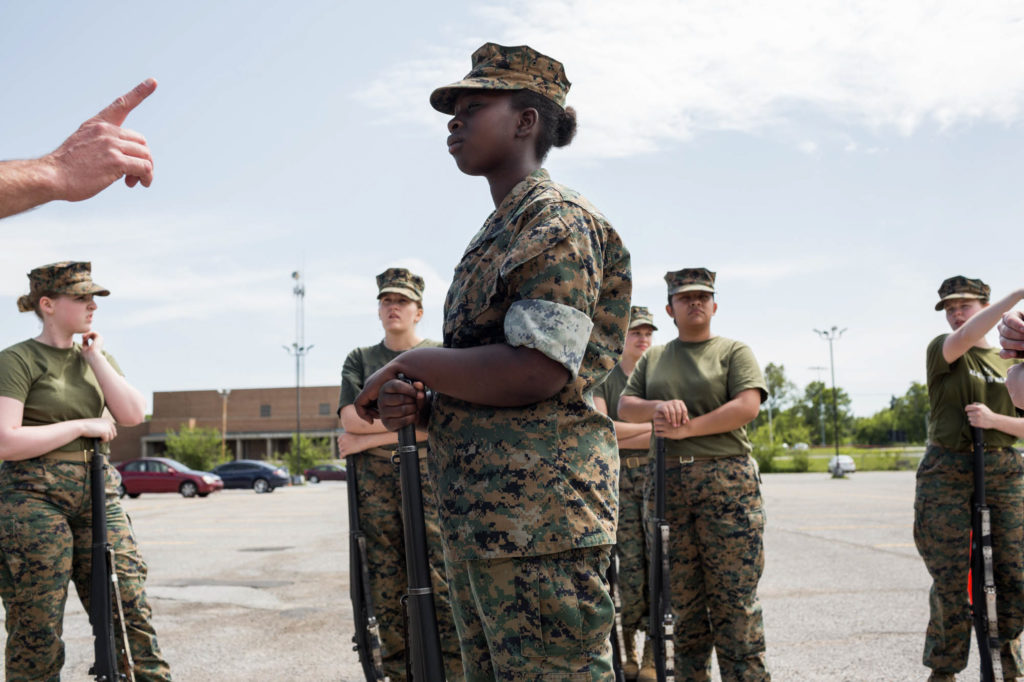
JROTC students from Fern Creek High School in Louisville, Ky., practice for an upcoming national drill competition in Daytona Beach, Fla., in May 2017. Pressure is high for the students to keep their reputation. Fern Creek has a history of high rankings, particularly its women’s team, which has placed first for 15 consecutive years. Credit: Sarah Blesener for Reveal
Without knowing it, Knudsen had tapped into a sentiment that would, five years later, help propel Trump to the presidency. The ethos of the Utah Patriot Camps (she said there are now 15 across three states catering to more than 850 children) represents a new era of patriotism that closely aligns with messages and policies being crafted in Washington, D.C.
The messages of “America first” and “Americanism” can be found at the forefront of far-right political movements such as the one driven by Steve Bannon, Trump’s former chief strategist, as well as in the pages of literature handed out at camps such as Knudsen’s.
“After the war, everybody wanted George Washington to be the king, because he was such a great leader,” a teacher told the class at the Utah camp Blesener attended in June. “And Satan tried to tempt him. Did you know that?”
A small boy interrupted: “What does ‘tempt’ mean?”
“ ‘Tempt’ means a kind of trick,” the teacher said. “Do you think he could have done a lot of good? He could have. But that’s not what God wanted, was it? He wanted this country to be free, right?”
The class took place in the shade of trees in a public park in Herriman. The park had been adorned with dozens of American flags, and they fluttered in the light morning breeze as the children moved from session to session.
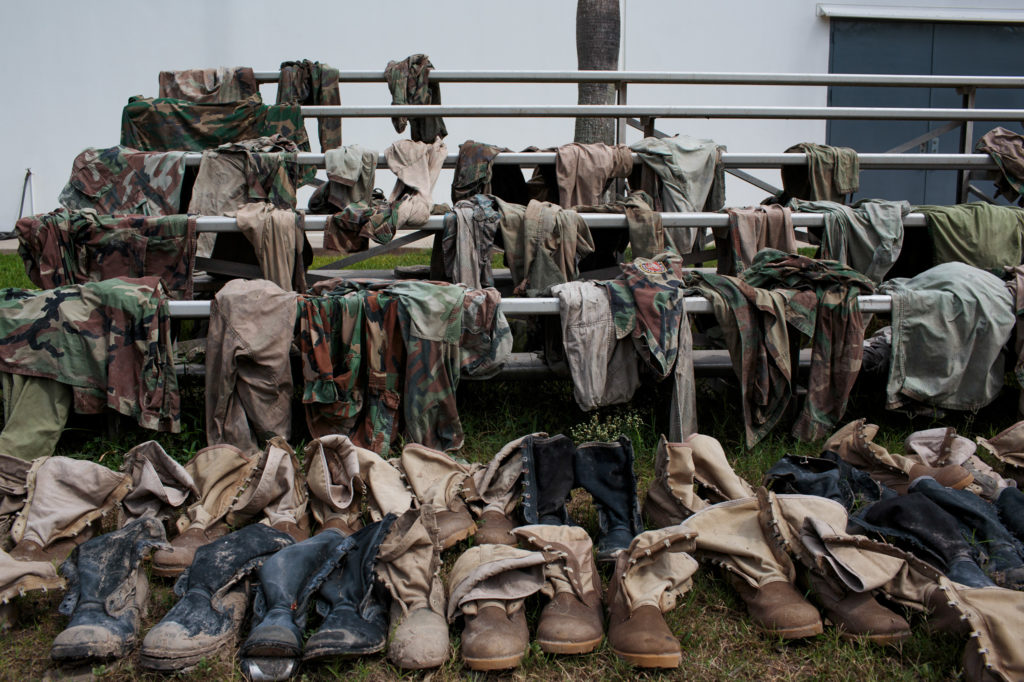
Uniforms dry on the bleachers at the Marine Military Academy in Harlingen, Texas, in July 2017. After spending the 105-degree day doing physical drills, crawling in mud and sprinting through obstacle courses, the boys spend the evening swimming in a pool across the campus. The academy’s summer camp hosts boys ages 12 to 18, with about 300 cadets in attendance.
Credit: Sarah Blesener for Reveal
Knudsen’s camp is inspired by the 9/12 Project, a now largely defunct organization launched in 2009 by conservative radio host Glenn Beck. Its motto was “Restoring America.”
Everything Knudsen heard and read about the project appealed to her. So she sent away for a copy of a Patriot Camp Handbook, written in 2010 by a group of Pennsylvania moms as “our attempt to generate enthusiasm in our communities about teaching children what makes America unlike any other nation.”
The manual became Knudsen’s blueprint for her camp. She expected a few applicants. She got more than 100.
“I think it filled a void,” she said.
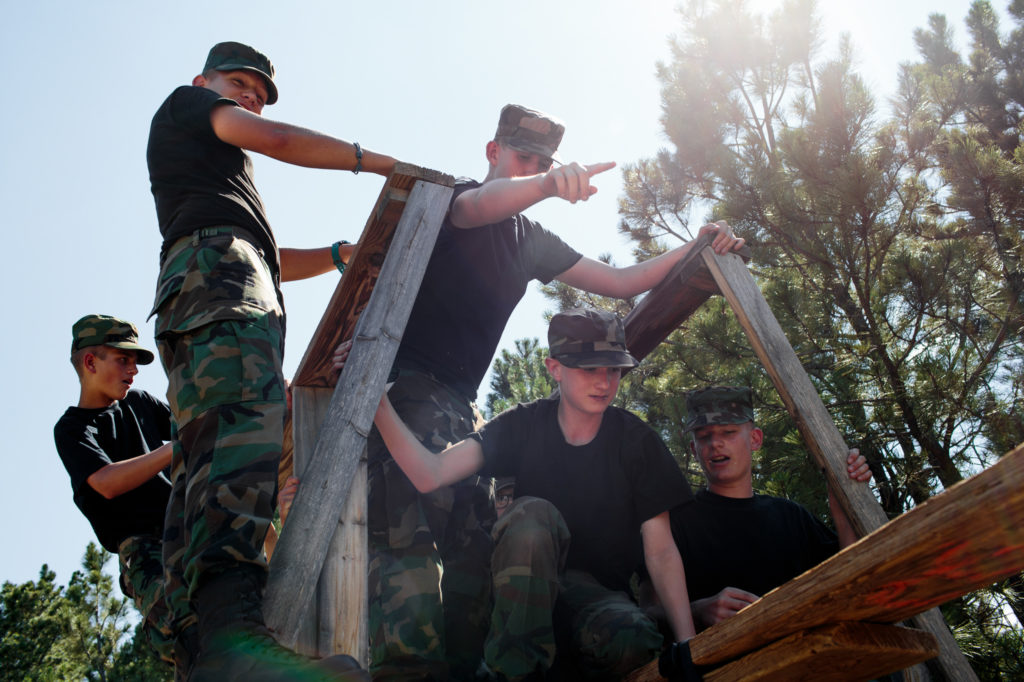
On an obstacle course at West Camp Rapid in Rapid City, S.D., a frustrated team tries for the fourth time to correctly build a makeshift bridge across a fort. Students from five states around the Midwest spend a week at the Civil Air Patrol Joint Dakota Encampment. It’s a 100-degree day in July 2017, and some students already have given up and retreated into the shade.
Credit: Sarah Blesener for Reveal
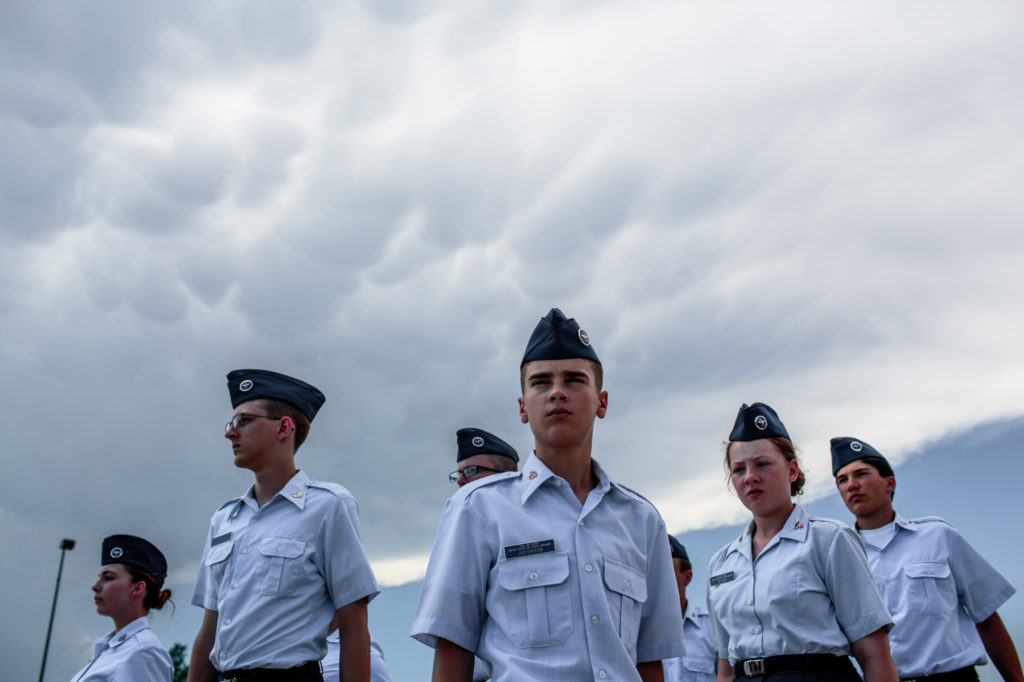
Most days end in the parking lot at the Civil Air Patrol camp in Rapid City, S.D., in July 2017. The smell of fast food from Arby’s drifts in the hot wind as students perform drills in unison, wearing matching navy uniforms with Civil Air Patrol decorations. Credit: Sarah Blesener for Reveal
The camps feature sessions during which kids sing the Declaration of Independence and include visits from actors dressed as the Founding Fathers. But there are also sessions such as a “redistribution of wealth” activity, during which half of the children do jumping jacks to earn Tootsie Rolls. The candy is then distributed evenly among all the kids – including those who did no “work.”
The manual gives guidance on what should happen next: “Emphasize that it is our own individual responsibility to be charitable,” it reads, “not the government’s job to redistribute our wealth, or take our money to give to others.”
While there are hints like this of right-wing politics in the manual and the lessons, Blesener was most struck by the camp’s overall ethos of unabashed American glorification and a focus on the U.S. as being founded directly by a higher power.
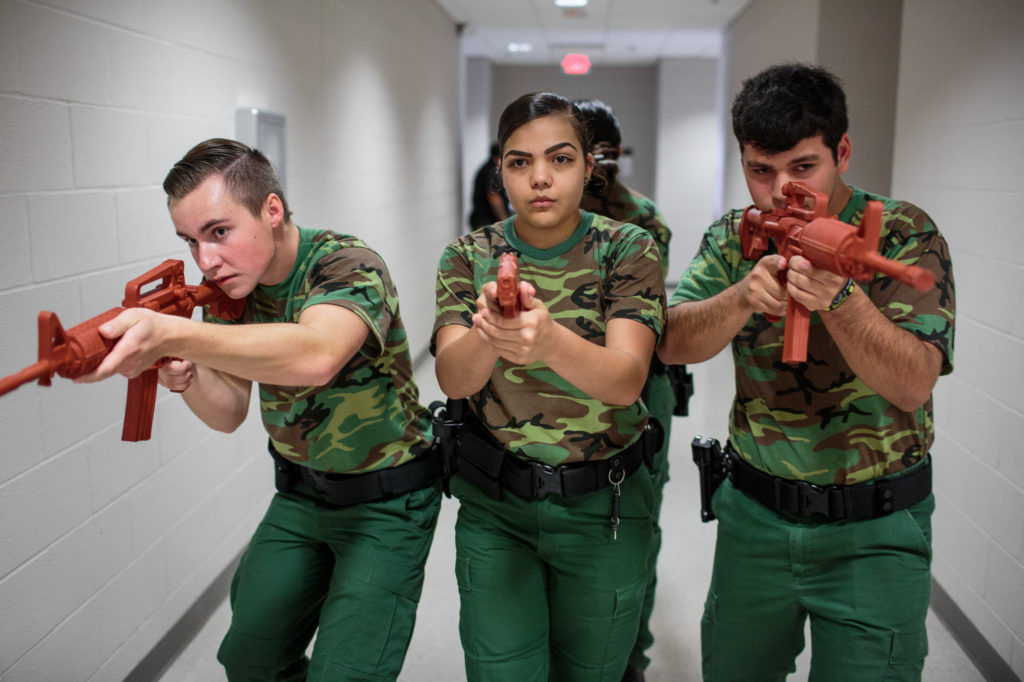
Ryan Dunlavy (from left), 19; Nerisa Garcia, 17; and Jeremy Cabral, 19, walk slowly and steadily down a hallway, practicing a room-clearing drill at a Border Patrol station in Kingsville, Texas, in July 2017. U.S. Customs and Border Protection and the Boys Scouts of America sponsor the co-ed Explorer Program, which allows teenagers to explore law enforcement career options.
Credit: Sarah Blesener for Reveal
A group of small children Blesener interviewed told her proudly that they were being taught how to become “modern patriots.” The children said they were learning “how God protected the soldiers against the Indians” and how “George Washington was protected by God to not be killed in battle.”
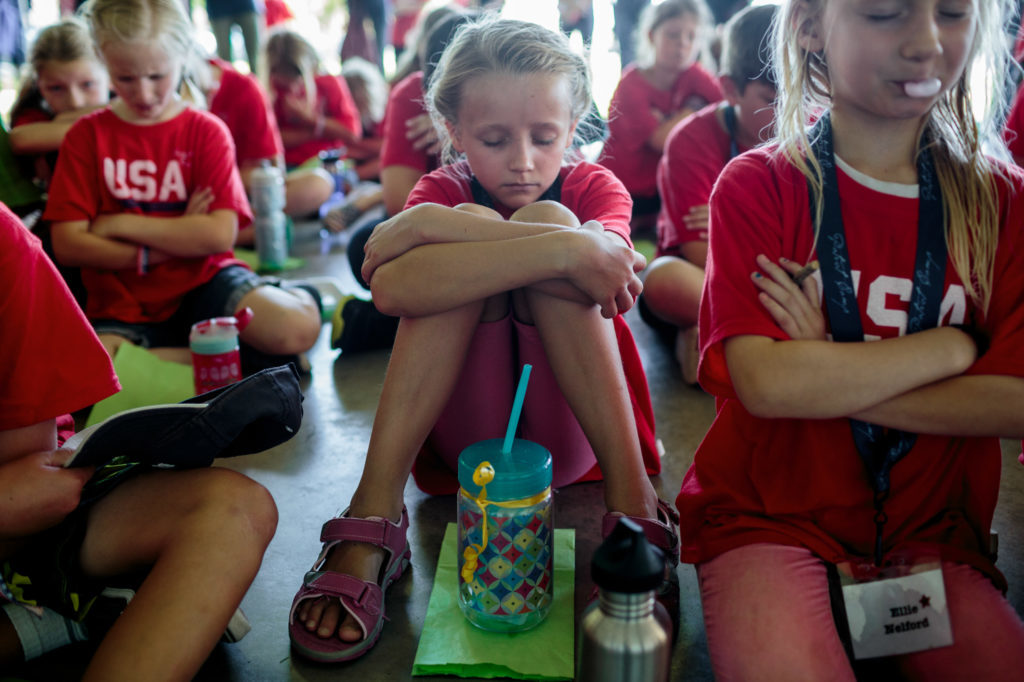
Students pray in June 2017 at the Utah Patriot Camp, a weeklong day camp, in Herriman, Utah. The camp for elementary school-aged children teaches lessons on the Constitution, American values, military history, the Bible and more. Camp co-founder Julie Knudsen says the camp was launched in 2011 as a reaction to Obama-era American apologizing.
Credit: Sarah Blesener for Reveal
“There was a lot of fun educational stuff – making popsicles, that kind of thing – but there was also this really kind of intense theory they were teaching,” Blesener said. “At one point, they were talking about the Declaration of Independence, and they said it was the first time in history that anybody had ever stood up to their king or queen, which obviously is just not true.”
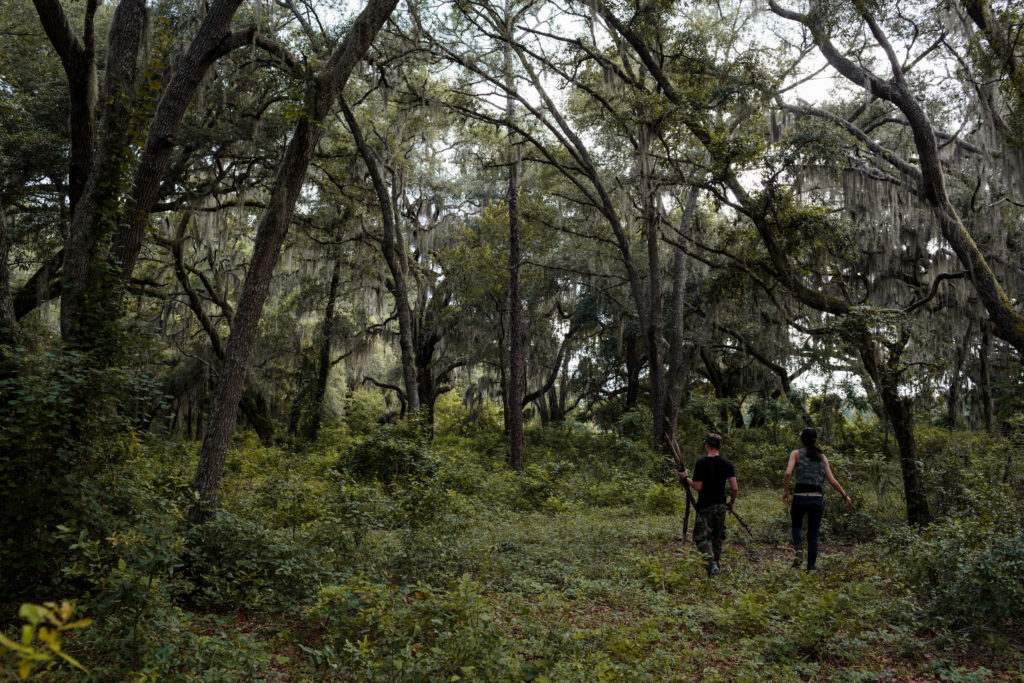
High school seniors Joseph Chubb (left) and Jasmine Burke search the woods for kindling while taking part in the North Florida Survival School in July 2017. The school holds a weekend training event in Keysville, Fla., in partnership with 10 CAN, a nonprofit organization for families of those in the U.S. military.
Credit: Sarah Blesener for Reveal
Public money for private boot camps
At a South Dakota camp run by the Civil Air Patrol – a quasi-military organization primarily funded by Congress – students discussed how best to display their American pride with a teacher brought in to instruct them on flag etiquette.
“In our generation, we obviously see that people don’t treat the flag with the respect it deserves,” one student said. “What should we do when we see a group of people disrespecting that?”
The instructor responded, Blesener recalled, by saying the children should intervene and share their knowledge of how to properly handle and respect the flag with their peers.
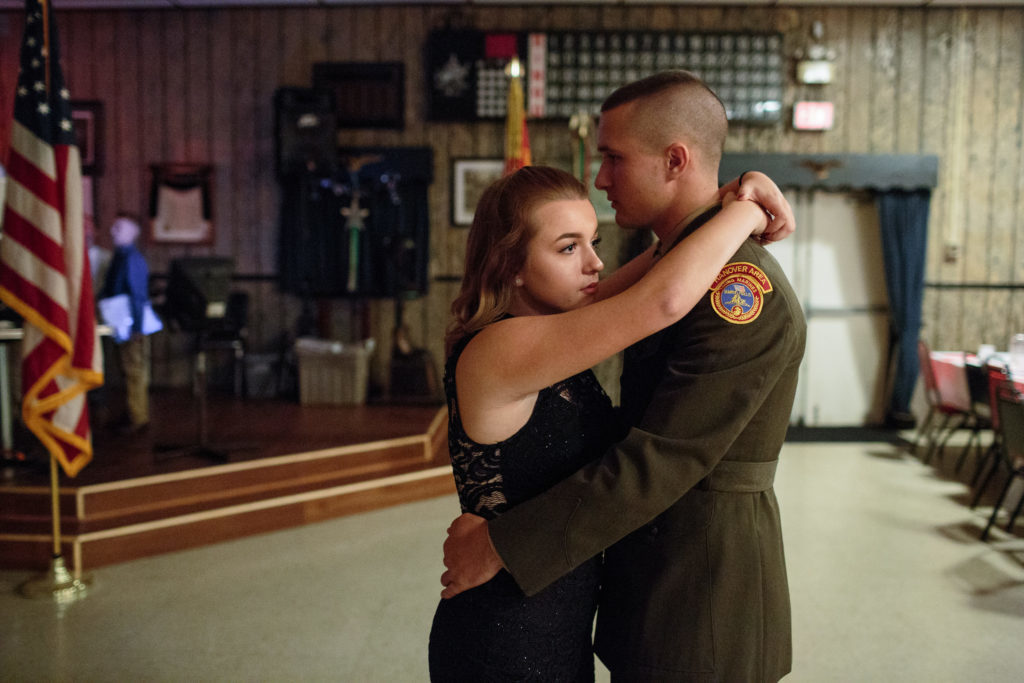
Garett Brauning, 17, dances nervously with his girlfriend, Ariana Grabowicz, 17, at the Young Marines ball in Hanover, Pa., in October 2017. Brauning’s mother had just given a tearful speech about his dedication to the Young Marines, his character as a son and his future. Now, it seems as though every eye in the room is focused on the high school senior.
Credit: Sarah Blesener for Reveal
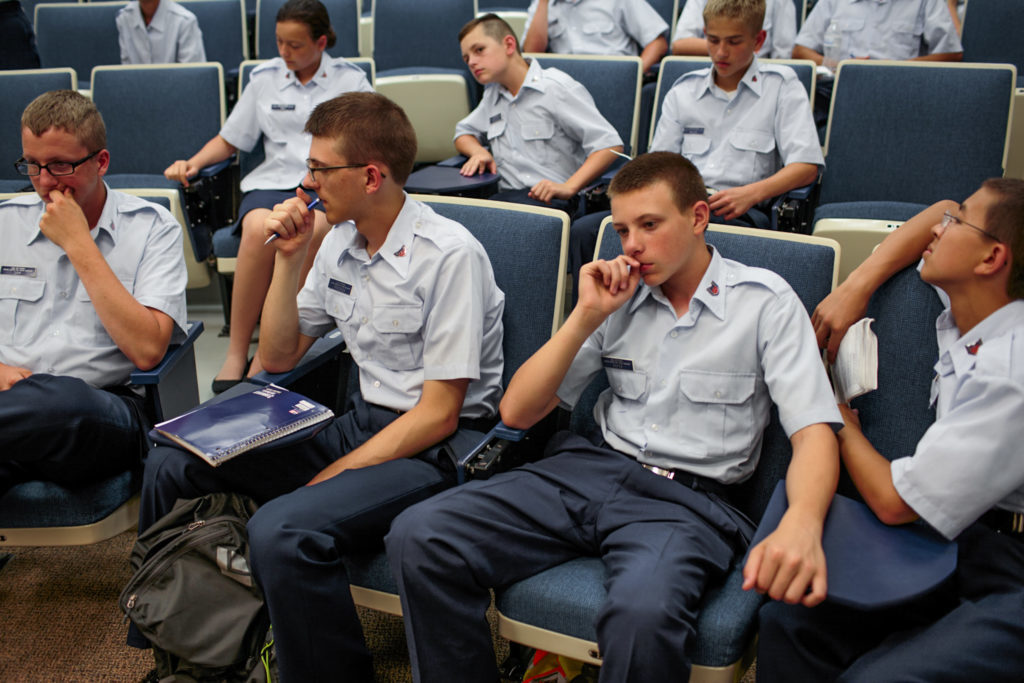
Students at the Civil Air Patrol Joint Dakota Encampment in Rapid City, S.D., wait for a critical thinking and self-management class to begin. While most activities are physical, such as drills and firearms training, educational courses take place every afternoon. Credit: Sarah Blesener for Reveal
At a camp run by another quasi-military organization, the Young Marines, Blesener watched children as young as 8 go through an initiation ritual that included dressing and undressing as quickly as possible. Most of the kids broke down in tears, Blesener said, only to be built back up again by their instructors.
As the drills ended, the children were comforted and told that they had succeeded where others had failed. They were now part of a family, an elite unit.
“Afterward, I was talking to the camp leaders and they were saying, ‘Nowadays, everyone is so politically correct. … Not everyone can take this kind of initiation, everyone is apologizing for their behavior,’ ” Blesener said. “We just want to be one of those groups that is proud of who we are and won’t apologize for it.”
Many of the quasi-military youth camps are privately run and funded, with some camps costing thousands of dollars to attend. Other camps are staffed by volunteers and are free to all. Young Marines camps lie somewhere in the middle, with some charging a nominal registration fee while the bulk of the costs are borne by the organization.
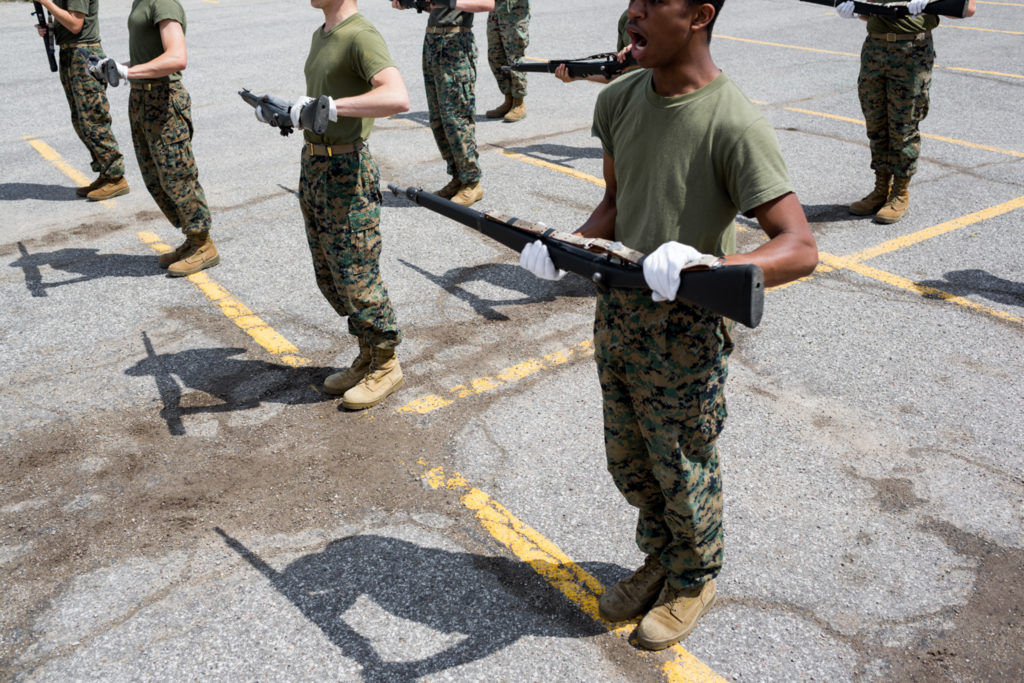
JROTC students from Fern Creek High School in Louisville, Ky., practice for an upcoming national drill competition in Daytona Beach, Fla., in May 2017. JROTC is one of the largest youth organizations in the world, with more than 300,000 youth enrolled. Credit: Sarah Blesener for Reveal
According to Young Marines’ tax filings, the nonprofit received more than $4 million of its about $7 million in funding from “government grants” in 2014. The tax records offer no additional detail about which grants the organization received. Bill Davis, Young Marines’ executive director, wrote in an email that the funds are from a federal grant in part for drug demand reduction efforts, administered by the Department of Defense.
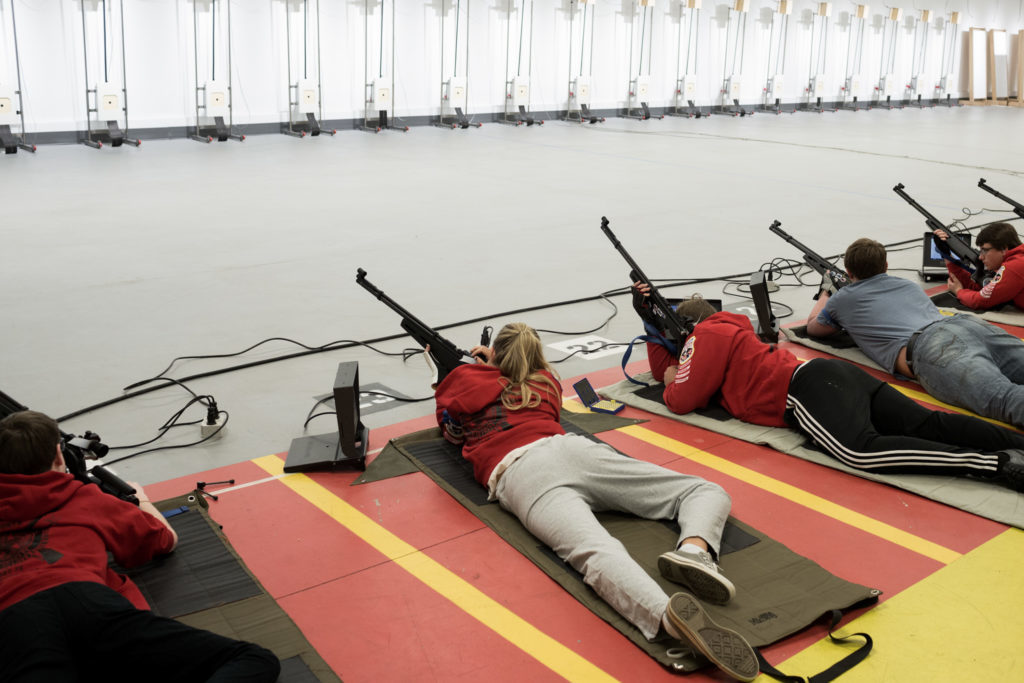
The Warrenton Rifles team, in its eighth year as a program, participates in a marksmanship competition in April 2017 in Warrenton, Va. National Rifle Association grants provide the team with state-of-the art equipment and rifles. Nationwide, about 15,000 students as young as 8 participate in the program.
Credit: Sarah Blesener for Reveal
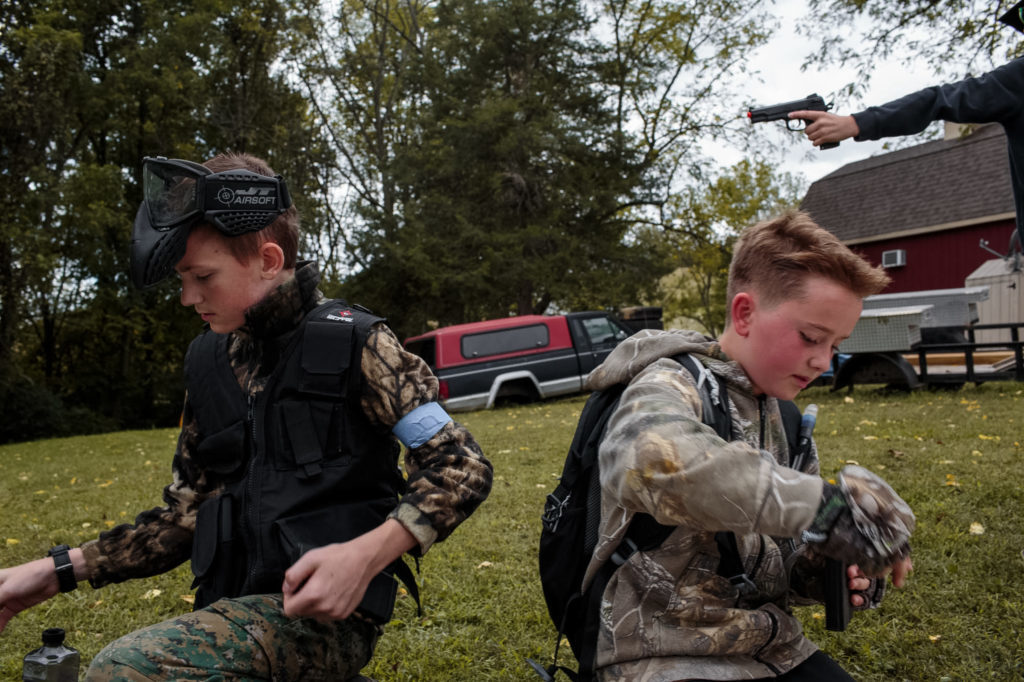
Members of the Young Marines, usually boisterous and chatty, are quiet and focused in September 2017 as they prepare for an airsoft competition in Hanover, Pa. Airsoft is a team sport in which competitors use replica weapons that fire plastic pellets to eliminate opponents.
Credit: Sarah Blesener for Reveal
“It’s a quasi-military recruitment program,” said Rick Jahnkow, an anti-militarist activist who founded two organizations aimed at preventing children from becoming “militarized” in schools. “It’s intended to plant seeds in kids as young as elementary school, so that eventually they either become recruitable or, at a minimum, their minds have been recruited.”
Jahnkow and other activists keep a close eye on the military’s attempts to recruit in schools. Traditionally, their campaigns have focused on programs such as the junior ROTC and military-funded shooting ranges in schools, with some success. They’re extremely concerned about programs – some funded by the National Rifle Association – that bring guns into schools.
These programs made national news recently after it was revealed that Nikolas Cruz, a 19-year-old charged with killing 17 people in a mass shooting at a Florida high school, had participated on a JROTC air rifle team supported by the NRA. Cruz was wearing a T-shirt with the shooting program’s logo when he was arrested.
But the uptick in recent years of private military youth camps funded with public money has opened a new front in the activists’ work, and it has them concerned.
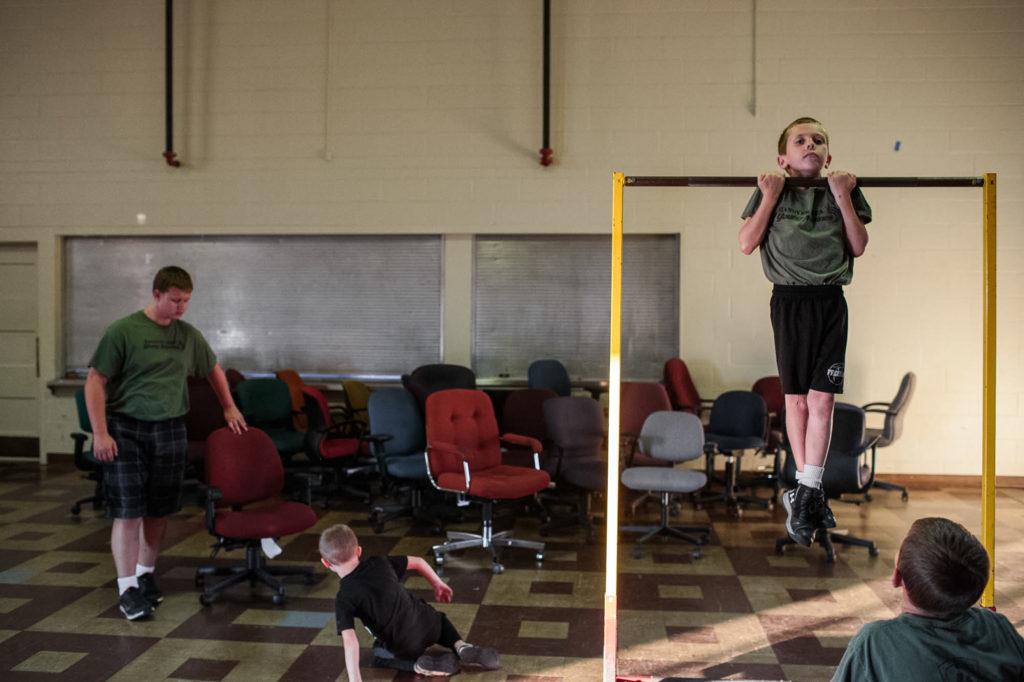
Members of the Young Marines in Hanover, Pa., run through physical fitness drills in September 2017. Drills include pushups, situps, pullups and a mile run. The group meets weekly throughout the year, as well as for some weekend boot camps. Credit: Sarah Blesener for Reveal
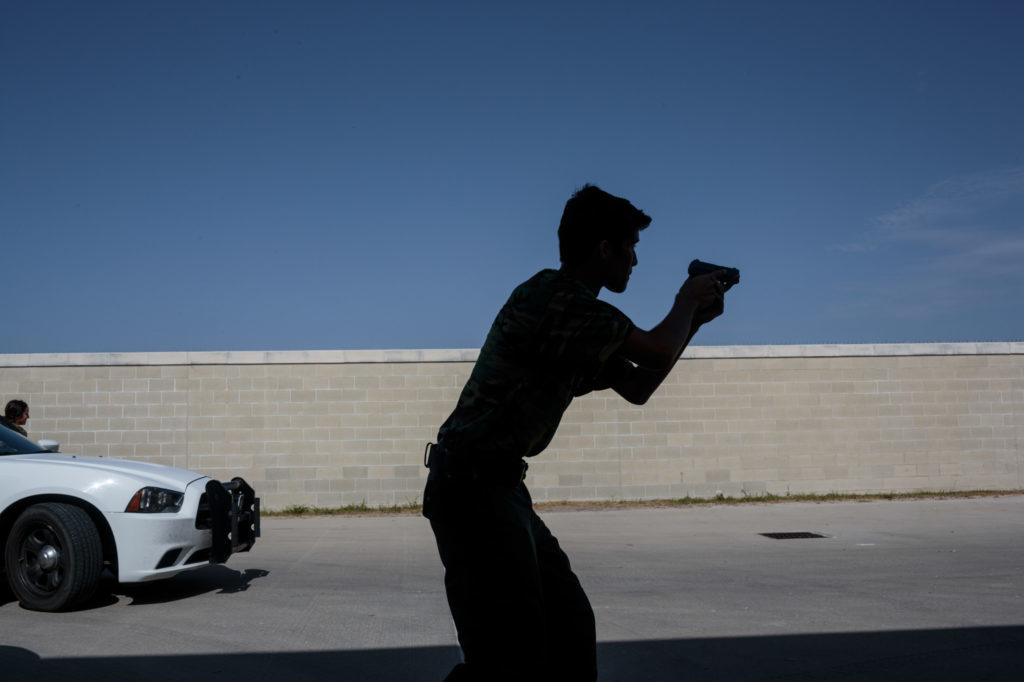
As part of U.S. Customs and Border Protection’s Explorer Program in July 2017, a student practices arrest tactics in a vacant Kingsville, Texas, parking lot. Participants as young as 14 use fake weapons that weigh the same as guns used by active Border Patrol agents. Credit: Sarah Blesener for Reveal
“It’s a creeping plague,” said Libby Frank, a member of the steering committee for the National Network Opposing the Militarization of Youth. “It’s all geared toward getting people used to the idea that the military is a major part of their life.”
Blesener, too, said she was concerned by how these camps exploit children’s vulnerabilities by instilling them with notions of America’s military might and moral exceptionalism.
“There is absolutely zero criticism of what the American military does overseas at these camps,” Blesener said. “Every single leader you talk to will deny that these are recruitment camps, but of course, they are. Introducing a child to an activity or a worldview at such a young age is clearly a way to steer them in that direction.”
One of the children Blesener met over the summer, 17-year-old Elizabeth Nelson, went on to enlist in the Army. Nelson said she learned at the camp that, on enlistment, she would get credit for her time spent there if she reached a certain rank at camp.
“I was like, ‘Wowzer!’ ” Nelson said. “I had always wanted to enlist, but when I heard about Civil Air Patrol, I was like, ‘This could really help me in my career.’ ”
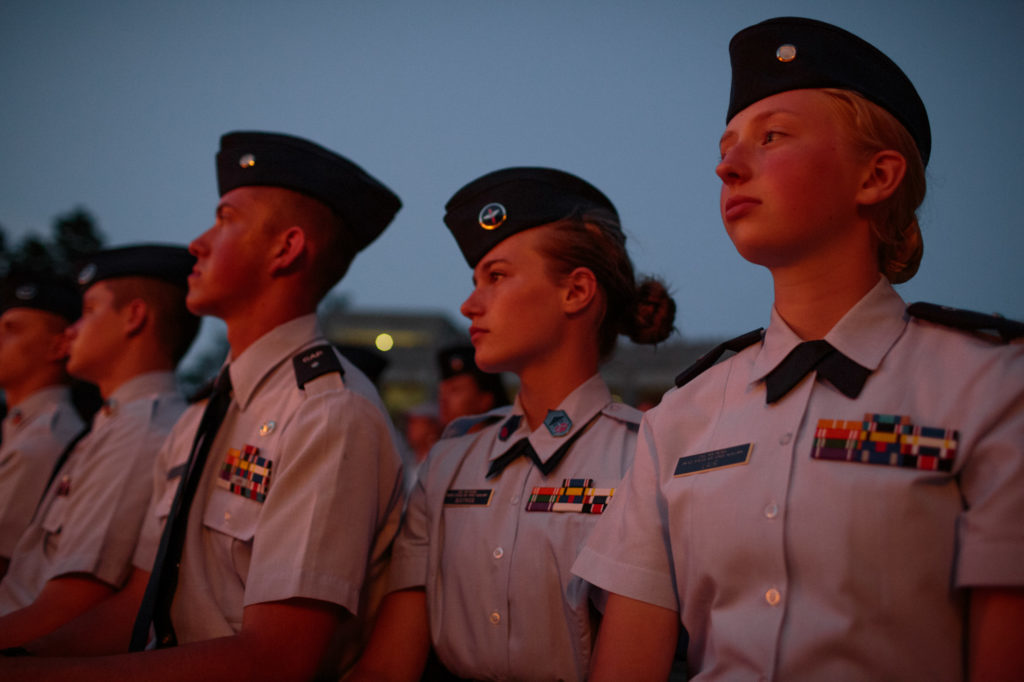
As the sun sets behind Mount Rushmore in July 2017, Civil Air Patrol campers Thomas Dillon (from left),16; Kayla Wayman,14; and Julia Lair, 15, watch a patriotic film describing the history of the United States and the making of the national memorial in South Dakota. Many of the 60 students in attendance have never visited the historical site before. Credit: Sarah Blesener for Reveal
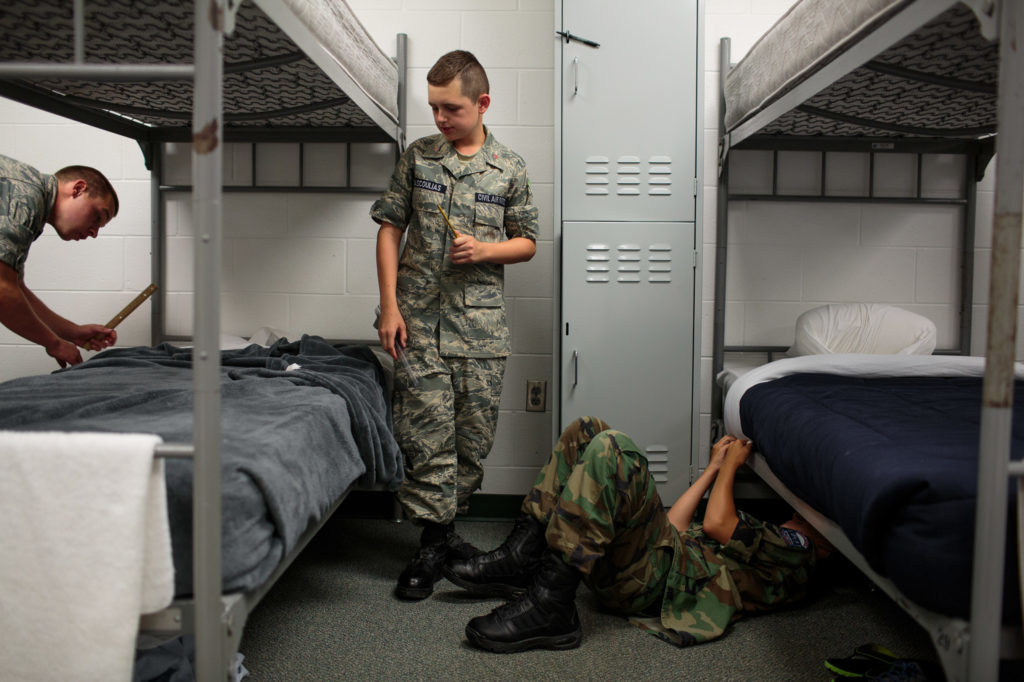
Young campers get ready for a bed and room inspection in July 2017 at the Civil Air Patrol Joint Dakota Encampment in Rapid City, S.D. About 60 students from the Midwest, ages 12 to 18, attend the camp.
Credit: Sarah Blesener for Reveal
Prepping for the ‘zombie apocalypse’
Children attending the North Florida Survival School talked a lot about the zombie apocalypse. They were joking, but for the older kids, the term was a sort of code – an analogy for a coming catastrophe that could be around the next corner.
“The zombie apocalypse is just the fun, easy way to look at it, but the reality is that at any point, an apocalypse could start, whether it is the economy or a nuclear attack,” said 17-year-old Jasmine Burke.
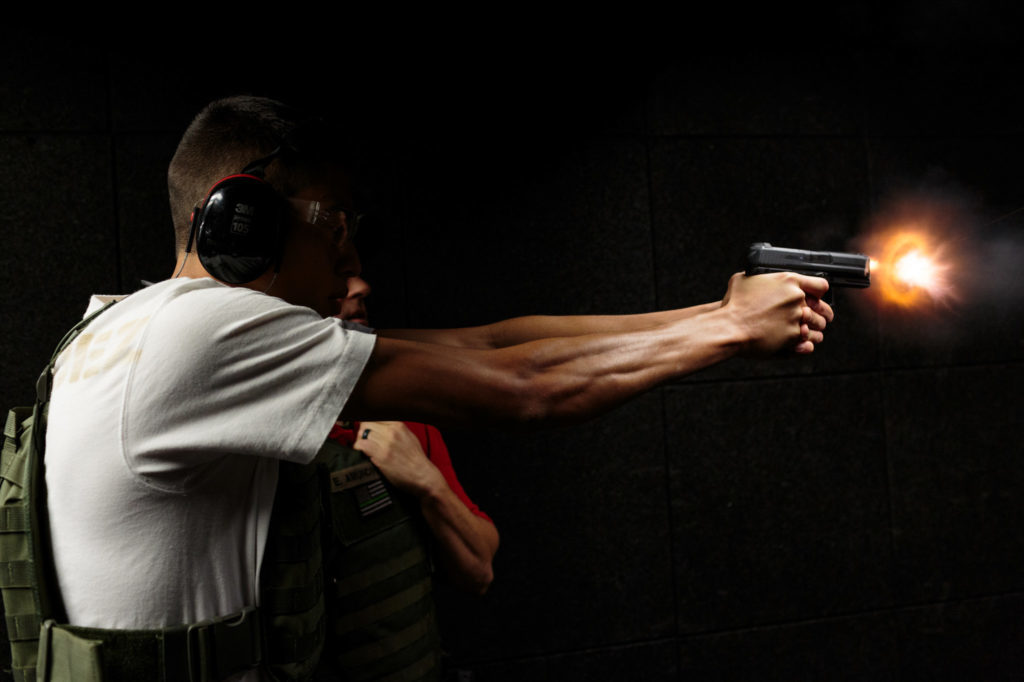
Javier Velasquez, 18, a student in U.S. Customs and Border Protection’s Explorer Program, shoots during a firearm training class in Nogales, Ariz., in June 2017. Velasquez’s shot is steady, and he is one of the top shooters in the program. Credit: Sarah Blesener for Reveal
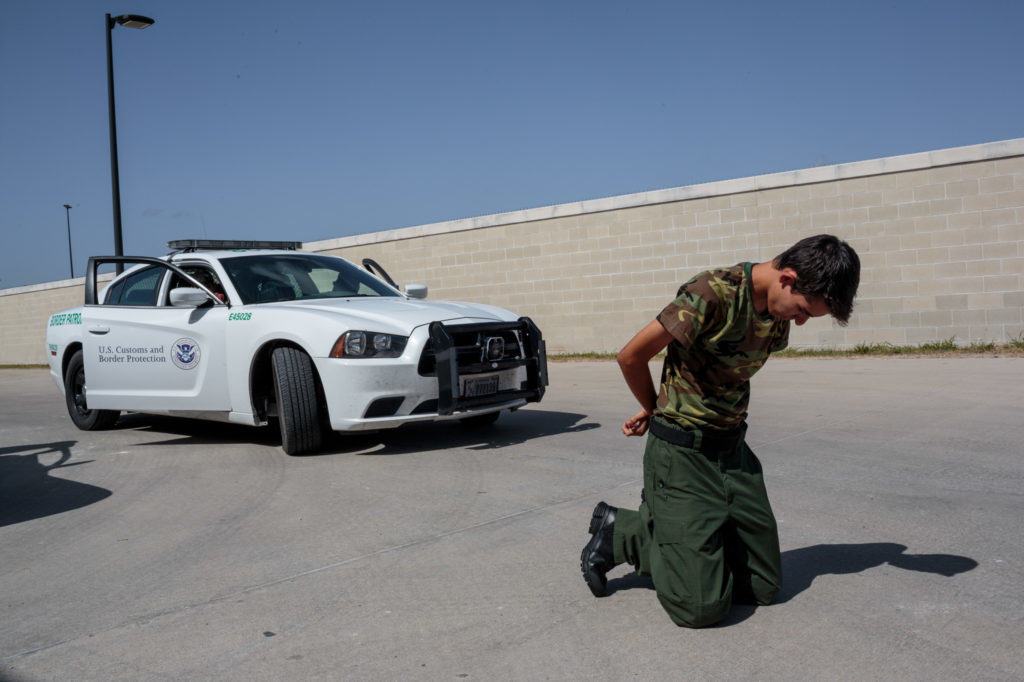
In an empty parking lot of a Border Patrol station in Kingsville, Texas, a small group of high school students practices stop-and-search arrests on one another in July 2017. The exercise is part of U.S. Customs and Border Protection’s Explorer Program. In the background, officers correct the students’ form and tactics and yell instructions. Credit: Sarah Blesener for Reveal
Many street-smart teenagers in New York, Los Angeles or Chicago probably would sneer at their devout, well-behaved counterparts in rural Florida, who spend their weekends learning how to build shelters, start fires and find edible plants, as well as holding prayer sessions and singing hymns by the lake.
Kids such as 17-year-old Joseph Chubb acknowledge this. He is well aware that city kids find it odd that teenagers might want to learn how to collect clean water or hygienically dig a latrine. But to teenagers attending the North Florida Survival School in late August, the ones who should be mocked are the teens sitting in their apartments in the big cities, assuming that their lights will always turn on, the Wi-Fi will never go out and the pizza guy will always deliver.
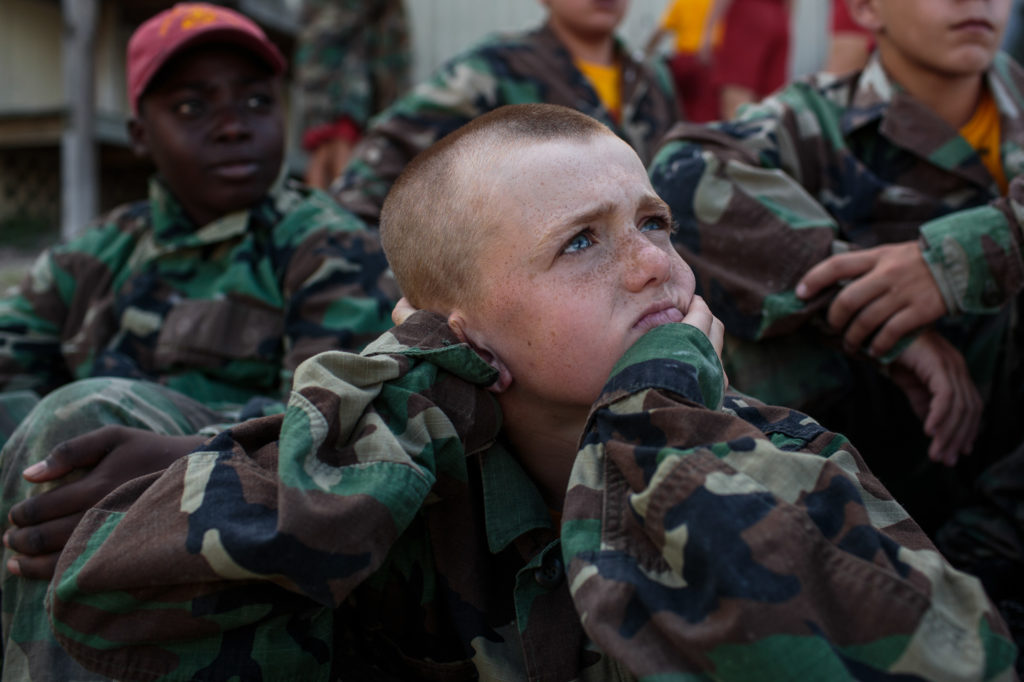
In 100-degree heat, elementary school-aged students rest during a July 2017 paintball competition at the Marine Military Academy in Harlingen, Texas. They share stories about video games, war and their families. Their camouflage paintball uniforms, made for children twice their size, hang loosely over their bodies. Credit: Sarah Blesener for Reveal
“Most people in America don’t even know how to light a fire,” Chubb said. “The shelter of the indoors, the increase in modern technology – it’s obvious we’ve become more dependent on that. When you don’t need to go outside and make a fire, you forget how to do it.”
The three-day midsummer camp outside Ocala culminated in an afternoon session firing rifles at a target by the lake. One by one, the kids donned ear protection and shooting goggles and learned how to properly load, aim and fire two different rifles.
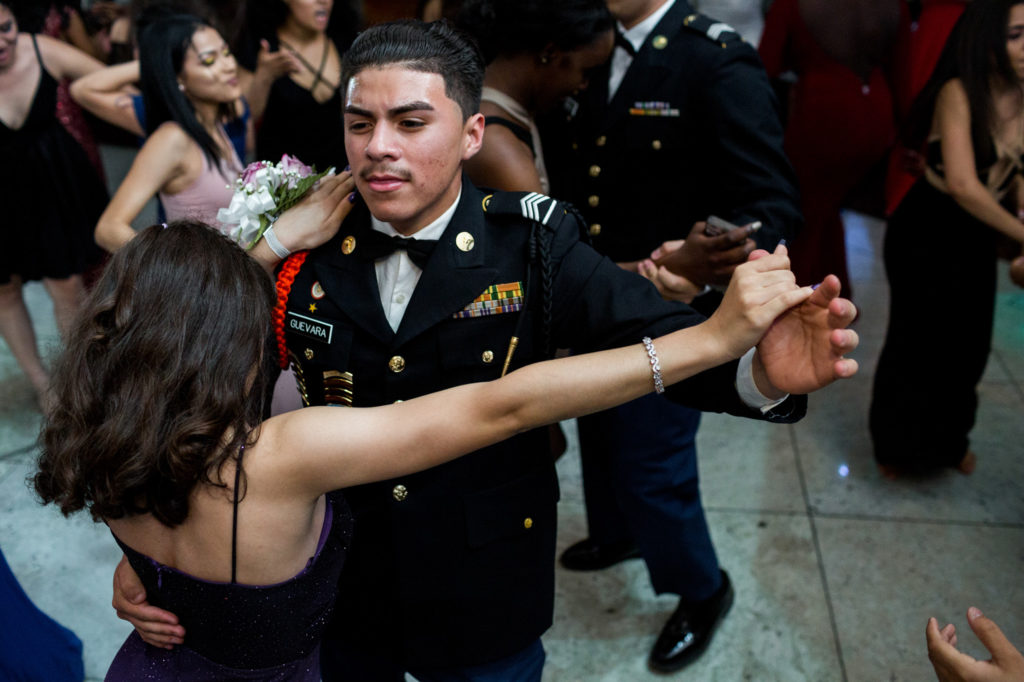
Isaac Guevara, 16, dances with another student in May 2017 at the end of the seventh annual Junior ROTC Military Ball at the Villa Barone Manor in the New York borough of the Bronx. Credit: Sarah Blesener for Reveal
For several of the children, who had been shooting for years, the training session was merely a refresher of the rules they had long committed to memory. But for 9-year-old Austin Gerthe, the afternoon offered some valuable lessons.
“One time, I shot my dad’s shotgun secretly,” Austin confided before the session. By the end of the training, however, the skinny, freckled boy had yet to master the rules of handling weapons. The instructors decided he was better off just watching.
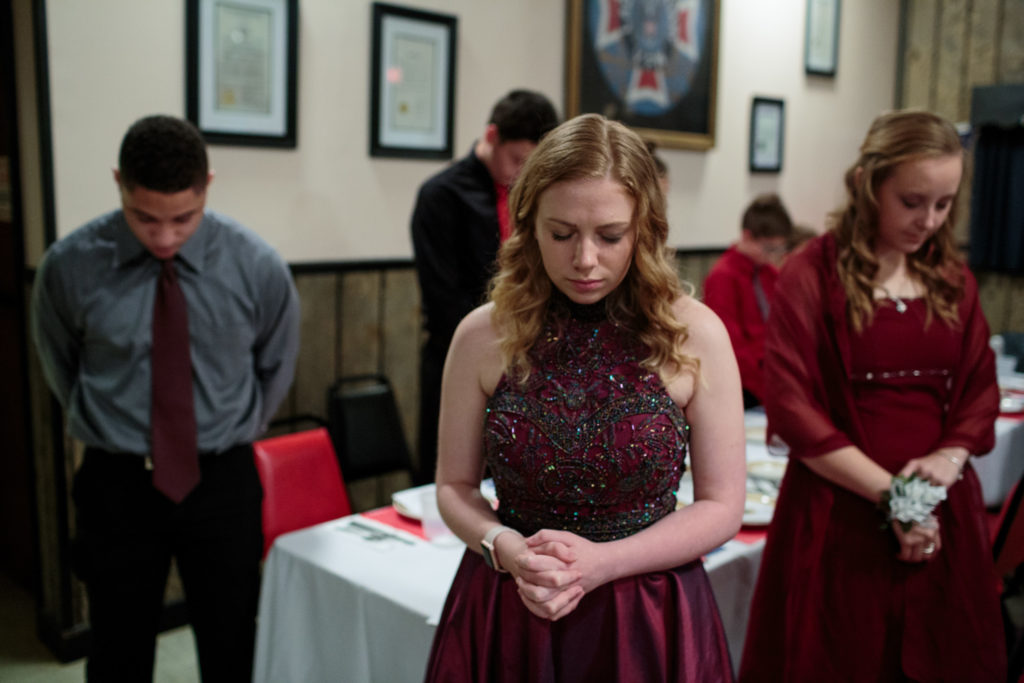
Children bow their heads as a speaker at an October 2017 Young Marines ball in Hanover, Pa., booms with gratitude – for God for the meal that is about to be served, for Pennsylvania, for the Young Marines and for America. Younger children in the corner open their eyes and shut them quickly. Giggles are hushed by adults. Credit: Sarah Blesener for Reveal
There are no reliable statistics showing whether demand for survivalist training camps is growing or waning. Steven Claytor, owner of the North Florida Survival School, said he has seen demand increase over the last few years, but suggested it had more to do with a flood of survival-themed TV shows than with Trump’s election or increased global geopolitical tension.
Other survivalist camps reported a more recent boost directly related to the 2016 presidential election.
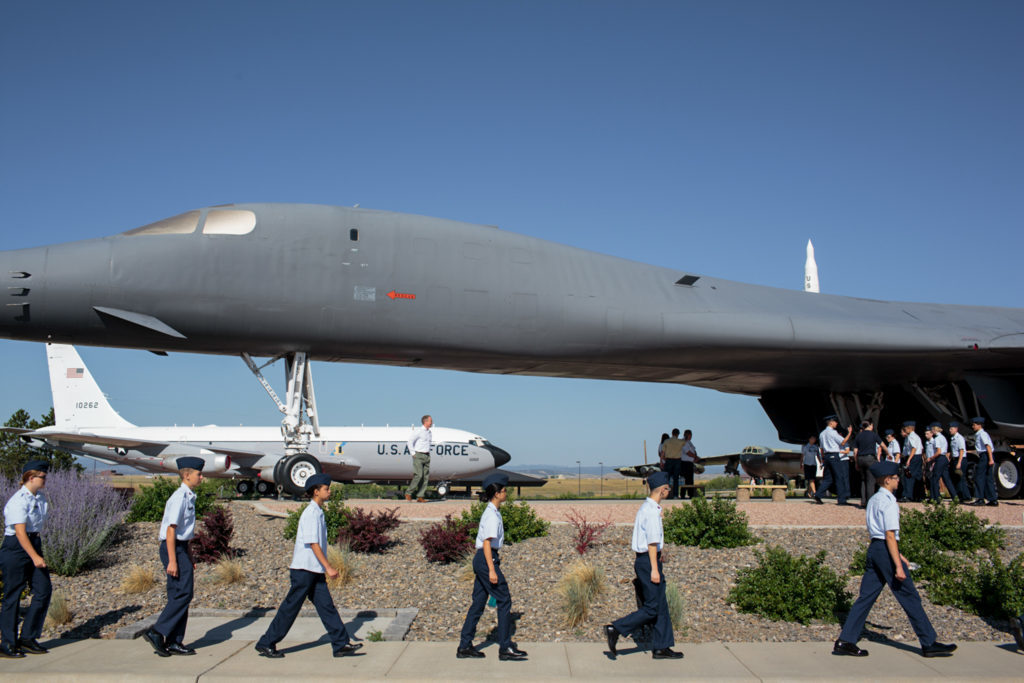
Civil Air Patrol students visit the South Dakota Air and Space Museum near Ellsworth Air Force Base in July 2017. Among its exhibits, the museum features vintage military aircraft, a modern B-1 bomber and a Minuteman II intercontinental ballistic missile.
Credit: Sarah Blesener for Reveal
“The phone hasn’t stopped ringing since Dumpy Trumpy took office,” said Shane Hobel, owner of the Mountain Scout Survival School in New York’s Hudson Valley. He said potential customers are “freaking out” about the possibility of Trump pulling the U.S. into a nuclear war. And they’re worried his leadership could cause the economy to collapse.
But Eric Giles, who owns the Texas Survival School in North Texas, had a different experience.
“It’s kinda slowed down,” he said. “It slowed down after the election. A certain group of people were worried about (Hillary) Clinton getting in, but they’re not worried anymore.”
_____________________________________________________
 Will Carless- Correspondent. wcarless@revealnews.org
Will Carless- Correspondent. wcarless@revealnews.org
Photographs by Sarah Blesener. She was a 2017-18 Catchlight fellow embedded at Reveal.
Go to Original – revealnews.org
DISCLAIMER: The statements, views and opinions expressed in pieces republished here are solely those of the authors and do not necessarily represent those of TMS. In accordance with title 17 U.S.C. section 107, this material is distributed without profit to those who have expressed a prior interest in receiving the included information for research and educational purposes. TMS has no affiliation whatsoever with the originator of this article nor is TMS endorsed or sponsored by the originator. “GO TO ORIGINAL” links are provided as a convenience to our readers and allow for verification of authenticity. However, as originating pages are often updated by their originating host sites, the versions posted may not match the versions our readers view when clicking the “GO TO ORIGINAL” links. This site contains copyrighted material the use of which has not always been specifically authorized by the copyright owner. We are making such material available in our efforts to advance understanding of environmental, political, human rights, economic, democracy, scientific, and social justice issues, etc. We believe this constitutes a ‘fair use’ of any such copyrighted material as provided for in section 107 of the US Copyright Law. In accordance with Title 17 U.S.C. Section 107, the material on this site is distributed without profit to those who have expressed a prior interest in receiving the included information for research and educational purposes. For more information go to: http://www.law.cornell.edu/uscode/17/107.shtml. If you wish to use copyrighted material from this site for purposes of your own that go beyond ‘fair use’, you must obtain permission from the copyright owner.
Read more
Click here to go to the current weekly digest or pick another article:
ANGLO AMERICA:
MILITARISM:
- Think Tanks Fueling Endless War - Think Tanks or Stink Tanks?
- Dolphins in the Military
- US Has Given Israel $22 Billion in Military Aid since October 2023
EDUCATION:
